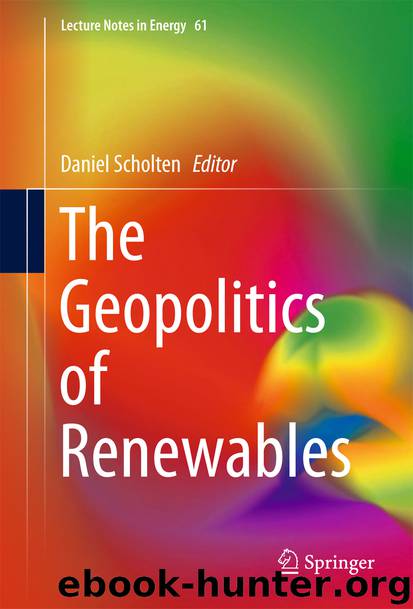The Geopolitics of Renewables by Daniel Scholten

Author:Daniel Scholten
Language: eng
Format: epub
Publisher: Springer International Publishing, Cham
6.3 The EU’s Geo-Energy Space
To explore the European reverberations of Germany ’s Energiewende within European energy politics from a geoeconomic perspective , technical, economic, as well as political factors need to be taken into account. The notion, that the societal function of energy (Verbong and Loorbach 2012, 9) is the product of socio-technological energy systems , represents a good starting point for this undertaking. Consisting of large technological systems (Mayntz and Hughes 1988) and the private and/or public systems4 that build, operate and govern their diffusion and use (Unruh 2000, 825–826), these systems evolve embedded in a wider environment ; the topography of this environment is defined by the geographical position of the land, climate and available resources, as well as softer features such as political constellations, economic cycles and broad societal trends (Verbong and Loorbach 2012, 9). The European level of this environment is only weakly developed due to (a) the fractured geography of Europe (which makes interconnection difficult to achieve technically and/or economically), and (b) the fact that for decades, energy companies and states were strongly orientated towards the national level as the most promising in terms of markets, financing and regulation (Van der Vleuten and Högselius 2012, 81).
In this semi-enclosed national context , a commingled relationship of (Abdelal 2011, 426), or opaque intertwinement (Pointvogl 2009, 5705) between energy companies and the state emerged. Consequently, energy is a field where the efforts to develop a degree of centralization encounter relatively strong difficulties (Lagendijk 2008). However, energy is also a field where self-sufficiency is not always the most favourable option. Historically, the development of energy systems in Europe was therefore accompanied by initiatives to increase the level of cross-border integration (Schipper and Van der Vleuten 2008, 6). Moreover, a number of institutions on the European level emerged for the purpose of coordinating the development of technical energy systems (Lagendijk 2008), even before the European Union increased its activity in this field in the early 1990s. Together, these initiatives resulted in some degree of integration of energy systems , the development of transnational power pools (Lagendijk and Van der Vleuten 2013, 76), and, with the EU gaining competencies in the field of energy , a level of governance on the EU-level. Yet the powers of the EU remain limited, and its governance structures could not bring the various energy policy positions of EU Member States into full alignment (Bössner 2015).
The result is what can be labelled the EU’s geo-energy space 5 (Manñé-Estrada 2006), a heterogeneous and multi-level (Smith et al. 2010) entanglement of energy systems across Europe under a thin governance structure. In this space, the various national systems interact closely and regularly, with a precise set of energy relationships taking place between the historically grown socio-technical systems on the national level (Manñé-Estrada 2006, 3781). Change in one national energy system, therefore, affects the energy metrics of the wider area and the relative position of others in it (Coccia 2010), with implications for (1) supply lines (Sattich 2016), (2) generation units (Brunix et al.
Download
This site does not store any files on its server. We only index and link to content provided by other sites. Please contact the content providers to delete copyright contents if any and email us, we'll remove relevant links or contents immediately.
50 Economics Classics by Tom Butler-Bowdon(2571)
Six Billion Shoppers by Porter Erisman(2302)
Why Nations Fail: The Origins of Power, Prosperity, and Poverty by Daron Acemoglu & James Robinson(2297)
No Time to Say Goodbye(2117)
Red Notice by Bill Browder(2082)
Currency Trading For Dummies by Brian Dolan(1929)
The Economist [T6, 22 Thg9 2017] by The Economist(1927)
Thank You for Being Late by Thomas L. Friedman(1770)
Bitcoin: The Ultimate Guide to the World of Bitcoin, Bitcoin Mining, Bitcoin Investing, Blockchain Technology, Cryptocurrency (2nd Edition) by Ikuya Takashima(1699)
Amazon FBA: Amazon FBA Blackbook: Everything You Need To Know to Start Your Amazon Business Empire (Amazon Empire, FBA Mastery) by John Fisher(1575)
Coffee: From Bean to Barista by Robert W. Thurston(1545)
The Future Is Asian by Parag Khanna(1484)
The Great Economists by Linda Yueh(1454)
How Money Got Free: Bitcoin and the Fight for the Future of Finance by Brian Patrick Eha(1425)
Grave New World by Stephen D. King(1421)
Pocket World in Figures 2018 by The Economist(1419)
Capitalism Without Capital: The Rise of the Intangible Economy by Jonathan Haskel(1401)
The Sex Business by Economist(1386)
Cultural Intelligence by David C. Thomas(1289)
